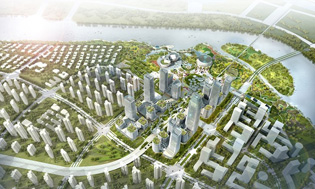CITIES OF THE FUTURE
24 Sep 2014
Setting a new standard for environmentally conscious urban planning, Eco City has been designed as an example of how cities can be entirely green developments.

Binhai Eco City has been designed as an example of how cities can be completely green developments. The project sets a new standard for environmentally conscious urban planning and has been shortlisted for the World Architecture Festival 2014.




The planned development is raised up on a plateau, with traffic and service areas located underneath, while green and pedestrian areas are made the focus. The plan includes a new central business district with office spaces and five new cultural buildings providing exhibition spaces, libraries, education spaces and sports facilities.
The buildings are all designed to minimise energy use and with passive building principles in mind, which make use of the building's surrounding environment for energy and heating efficiency. The buildings will also use solar panels and geothermal heating and cooling to achieve near-zero energy footprints.
The project was designed by Holm Architecture Office (HAO). The company founder Jens Holm explains how the plan mimics an outstretched hand, mixing green and functional areas.
"This design allows the green areas to slide in-between each finger, inviting direct interaction throughout the day and night and creates five islands that house the cultural buildings. The direct access to the green surroundings makes the Eco City Master Plan distinctive and affords its future inhabitants a vibrant and healthy place to live, work and play."
Different ecologies are spread throughout the site. Amongst the planned landscapes will be trimmed grass lawns for recreational and meeting places, marshlands that allow water to sink through the earth, and flowering meadows. In addition, there will be cultural landscapes containing solar panels, geothermal fields, experimental agriculture fields, opportunities to learn about sustainability and new technologies, as well as activity zones for recreational use.
The World Architecture Festival 2014 runs from October 1-3 in Singapore.







